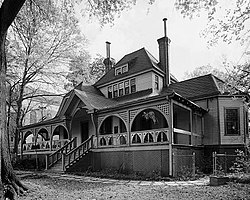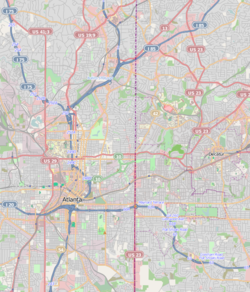Joel Chandler Harris Home
|
Joel Chandler Harris
|
|

HABS photo from 1985
|
|
| Location | Ralph D. Abernathy Blvd., SW, Atlanta, Georgia |
|---|---|
| Coordinates | 33°44′16″N 84°25′20″W / 33.73764°N 84.42219°WCoordinates: 33°44′16″N 84°25′20″W / 33.73764°N 84.42219°W |
| Area | 3 acres (1.2 ha) |
| Built | 1870 |
| Architect | Unknown |
| Architectural style | Late Victorian |
| NRHP Reference # | 66000281 |
| Significant dates | |
| Added to NRHP | October 15, 1966 |
| Designated NHL | December 19, 1962 |
Joel Chandler Harris House, also known as The Wren's Nest or Snap Bean Farm, is a Queen Anne style house at 1050 Ralph D. Abernathy Blvd. (formerly Gordon Street.), SW. in Atlanta, Georgia. Built in 1870, it was home to Joel Chandler Harris, editor of the Atlanta Constitution and author of the Uncle Remus Tales, from 1881 until his death in 1908. He is most known as author of the "Uncle Remus" tales, based upon stories he heard slaves tell during his youth.
The house was designated a National Historic Landmark in 1962 for its association with Harris, and is also designated as a historic building by the City of Atlanta. It is now a historic house museum.
The house was built circa 1868 in an area then known for its upper-class residents. Harris began renting the home in 1881 before buying it two years later thanks to earnings from his first book Uncle Remus: Songs and Sayings. He lived here until his death in 1908. Harris had the home extended with six additional rooms and a new Queen Anne-style facade added in 1884. A furnace, indoor plumbing, and electricity were added circa 1900.
Harris originally referred to the home as Snap Bean Farm, as a reference to fellow author Eugene Field's home Sabine Farm. The name "Wren's Nest" came from his discovery of a family of wrens living in the mailbox in the spring of 1895.
After several years of correspondence, Indiana poet James Whitcomb Riley visited Harris at Wren's Nest in 1900. Harris's children were especially interested in Riley and nicknamed him Uncle Jeems.
Ultimately, Harris wrote more than twenty books while living in the home as well as several editorials for the Atlanta Constitution and various articles for magazines and newspapers — including his own, The Uncle Remus Home Magazine.
...
Wikipedia



